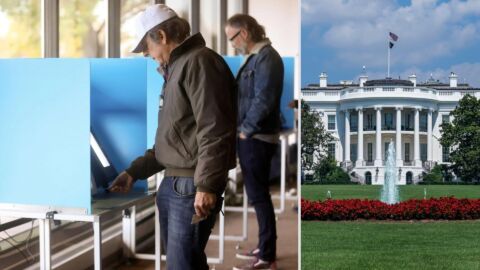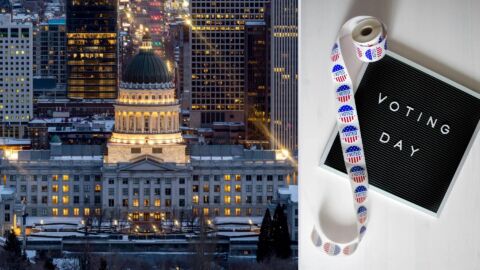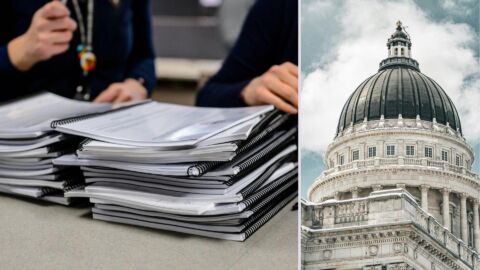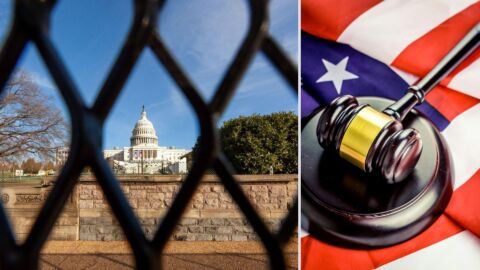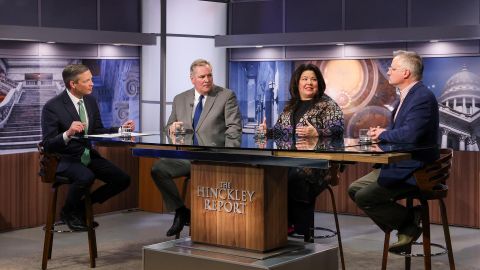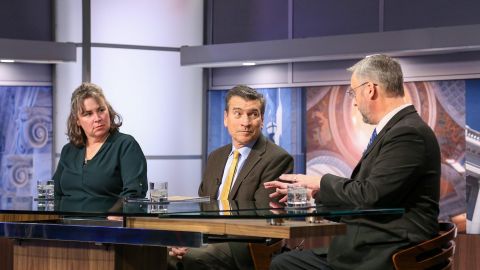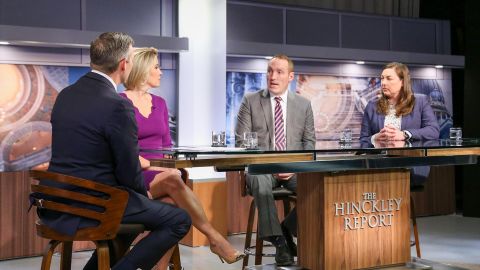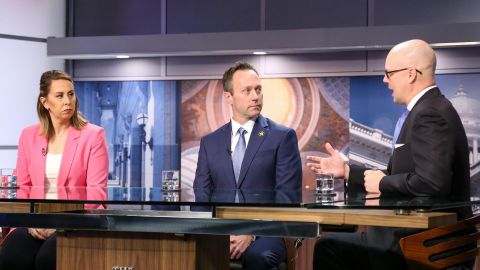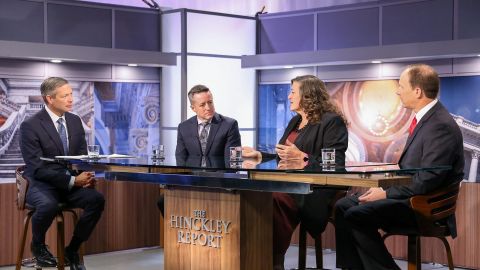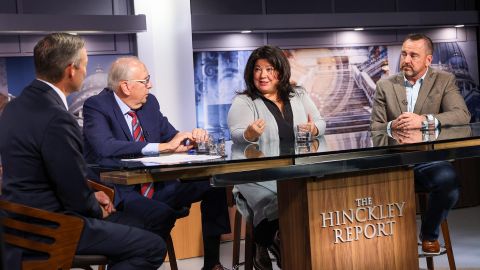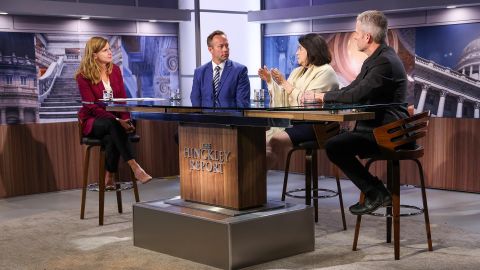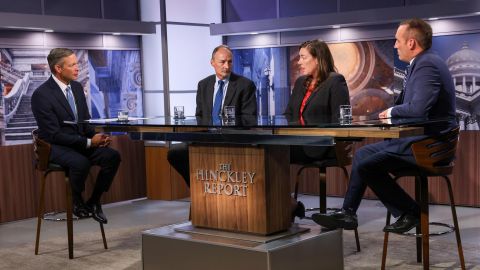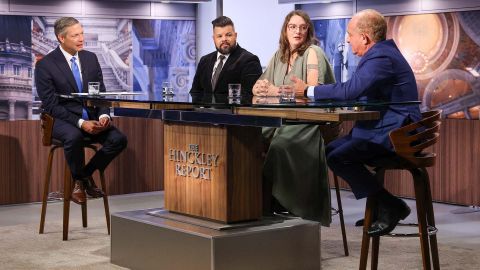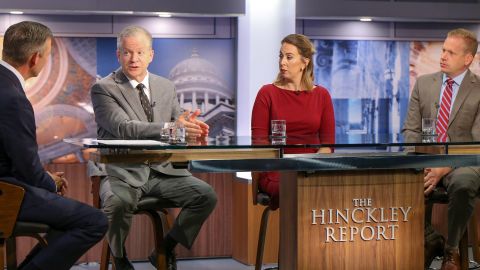♪♪♪♪♪ male announcer: Funding for "The Hinckley Report" is provided in part by the Cleone Peterson Eccles Foundation Fund, Merit Medical, and by contributions to PBS Utah from viewers like you.
Thank you.
Jason Perry: Tonight on "The Hinckley Report," presidential candidates go head to head in the most anticipated debate of the year.
Candidates vying to become Utah's next governor take stage and make their case to voters.
And the third district court releases a new ruling that will have a major impact on the ballot.
♪♪♪♪♪ ♪♪♪♪♪ Jason: Good evening and welcome to "The Hinckley Report."
I'm Jason Perry, director of the Hinckley Institute of Politics.
Covering the week, we have Ben Winslow, reporter with Fox 13 News; Kate Bradshaw, member of the Bountiful City Council; and Frank Pignanelli, political commentator and lobbyist with Foxley and Pignanelli.
Thank you so much for being here.
This is the end of quite a week in the political world.
Wow, much to get to.
I wanna start talking about a couple of things when it comes to debates first of all.
Ben, let's start with you.
Can we talk first about the presidential debate and then the governor's debate?
But I want to start a little higher level.
I mean, it almost seems like too easy of a question, but do debates matter?
Do people care that we have them?
Ben Winslow: Yes, I would say they still matter.
I would say they're still important.
Candidates may not necessarily like them, but they are beneficial for the public.
And this is why is because they're no longer on their talking points.
They don't just get to spin it how they want, they're having to answer a moderator's questions, maybe in--the audience's questions in a town hall style format, but you learn more about it, and then you get the healthy debate about whose policies are better.
They're informative to the public I think.
Jason: Kate and Frank, I want you both to answer this because currently an elected official, Frank, you've been an elected official.
What's your view from that vantage point on these debates?
Wanna start, Kate?
Kate Bradshaw: You know, debates are something that are stressful for a candidate as Ben pointed out.
You have to not just answer the moderator's questions or an audience question, but you may be responding to your opponent too, and you got to, you know, be quick on your feet about what you're gonna say.
So, it does give voters a different viewpoint of those people.
And you know, it also gives us, you know, moments we wouldn't otherwise have.
I would frankly be unaware of this significant issue of cats and dogs in Ohio had I not watched the debate.
Frank Pignanelli: Lucky for you.
Well, as someone who has watched every single televised presidential debate since--and that includes 1960 when I was sitting on my mother's knee, I can tell you that they do make a difference.
Because something happens in those debates either solidifies where things are going or it can actually cause a change.
In most of our debates, the presidential debates especially, are usually identified by one thing, Nixon sweating too much in 1960.
The mistake that Ford made in the 1976 debate, 19--and of course, the Reagan debate in 1980 where he made a funny comment that really solidified his trajectory.
And of course, now we have in 2024 the eating pets debate, which will forever be remembered in the minds of the political.
Ben: Biden dropping out.
Frank: Biden dropping out debate.
Jason: Well, I guess that's right, Ben, you ask President Biden if a debate matters?
Certainly it did.
Ben: Replaced a presidential candidate.
Jason: Kate, talk about a couple of key takeaways from that presidential debate.
Kate: Sure, it was really interesting, you know, the issues they focused on, you know, the economy, immigration, abortion, all of those got air time.
And one of the things I think that also stood out that became something that's maybe flipped is before the debate we were hearing that Harris maybe wasn't telling us enough about her economic plans.
And instead, you know, we heard more about her plans and Trump had this interesting line right where he was like, "Well, I'll tell you my plans, they're coming."
And instead of seeming like the one that had plans now, he seems like the person who doesn't have a plan.
And that's one of these interesting things that I thought came out of the debate, and you know, something that really kind of flipped in Harris's favor because of the fact that she came across as more prepared to discuss her plans.
Frank: Well, as you pointed out, yes, I have been in a candidate where I've been in debates for several different races.
I've also advised candidates on preparation for federal races.
What you have, the number one thing is a strategy.
You have to have a strategy of how you're going to present your case, how you're going to rattle the other side.
Harris had a strategy which was, you know, remove herself from Biden, show strength, and rattle Trump.
And it was dreams and ambitions, rattle Trump.
She created all these rabbit holes and he went down every single rabbit hole.
I believe Trump had a strategy to pick at pieces of it, especially towards the end we talked about.
Well, you why would you done this last 3 1/2 years?
But he went down these rabbit holes.
So, her strategy worked.
So, that's why you're picking up across the country that she won is because she stuck to her strategy.
Trump had no strategy other than the bits and pieces at the very end.
Jason: Ben, just one last piece on this.
One of the strategies seem to be trying to set Kamala Harris as her own candidate not attached to Biden or his policies.
From that perspective, I know you've been interviewing people about that.
Did that come through or are they still connected in voters's minds?
Ben: I think it's--you're starting to see an evolution, at least what we're--what it appears is that Kamala Harris is becoming her own candidate, not just the vice president, but the front runner for the Democratic Party on this.
So, I think you are seeing that that's starting to emerge now in the debate largely did solidifies that in people's minds that she is her own person.
She's not tethered to the Biden administration or at least this is what she will do going forward.
Certainly Republicans though, are still trying to tether her very much to the Biden administration and its policies.
Jason: One more on this Frank, because it appears that President Trump has announced last night that he will not do another debate.
So, this might be the only chance we have.
And this was big as I saw this, about 67 million people watch this.
This is like Super Bowl viewership for this debate and he has--he said no to the second one.
Frank: He did and I was thinking about this, why would he?
Because in most of the debates, he--that was his seventh debate and most of the other than the Biden debate, he was viewed as he lost those debates.
So, debates don't advance Trump.
And I for--I think for, you know, obviously it's still close race, so, I don't think there was an advantage for him to do another debate.
Jason: Talk about it being close.
I wanna talk about endorsements for just a moment, Ben.
Kamala Harris picked up a big one.
Ben: Big, Taylor Swift, big.
And Beyonce.
Jason: Oh, and Beyonce?
Ben: Beyonce gave her the rights to the music, which is a tact to endorsement.
Jason: I guess that is true.
Kate, what's also interesting about this is after this endorsement, it appears that there are a lot of people that were--they got moved to registering to vote after that endorsement.
Kate: You know, people should not underestimate Taylor Swift.
She has an incredible marketing arm.
I mean, she's kept her songs at number one all summer.
She and Travis have been on this, you know, amazing romance all summer that we've all followed and watched, her concerts register on the Richter scale for earthquakes.
She moves the economics of wherever she's hosting.
One of the tour stops for her concert series.
She's a force and she's really popular with a younger set who may not have thought about registering and, you know, often there with their parents as well.
So, I would never be one to underestimate T Swift.
Jason: Okay, I wanna ask about that for you, Frank, because we've talked about this in the past.
There's a little bit, people wonder is there a lot of influence in your yard signs?
Is there a lot of influence in the endorsements?
Why don't you attack both of those for a second?
Frank: I would say there's more influence with lawn signs than there are endorsements.
And because the, the studies have demonstrated that celebrity endorsements may work in primaries, but they don't work otherwise.
And I don't wanna be the grumpy old man here, but I think it's great that she's participated in the process, but this is coming down to 300,000 people across seven states and I don't think she's going to make much of a difference there.
What does happen though is that it generates a lot of enthusiasm and a lot of across the battlefield.
But the end of the day, it's those 300,000 people.
Endorsements only matter if they have a special connection to someone.
That's why when it comes to endorsements, the smart campaigns are taught asking people to reach out to their neighbors, to their friends, or family members.
Those are the endorsements that matter, especially in a general election.
Ben: I would argue you need to shake it off and just recognize that Taylor Swift is in a whole new level.
Jason: You got the lyric in, Ben.
Thanks for that.
Of note, before I leave this, Kate, is--President Trump is gonna be in town this week.
According to the FEC, it's interesting to see where Utahns are.
Trump is in the lead in this polling here, but in terms of money, $2.2 million have gone to Harris $1.7 million to Trump.
That could be until this visit.
Kate: So, he is coming, you know, this has been on-off, it was gonna be in Park City.
Now, it's gonna be a short stop in Salt Lake.
You know, will that stop at the Salt Lake International Airport generate enough money to, you know, move those numbers up for him?
You know, that'll be interesting to see.
He is asking for some really high dollar prices to attend this quick stop fundraiser and take a picture with him.
So, we'll be interested to see if there's really a great turn out there.
Jason: You got a comment, Frank?
Frank: Well, it's, listen, we're a flyover state so he's just here to get the money and fly back.
They're spending their time in the seven states.
What is interesting about the poll though is this, is that the last time you polled the Biden-Trump.
Biden was at 20% and dropping.
Harris is now getting back up.
That's--to me that's significant because Biden was becoming such a problem for local Democrats that in some of the swing districts if he remained on the ticket, they could have lost their seat.
At least with Harris, they're in safer territory.
So, that to me is a significant difference with having Harris on the ticket.
Jason: I wanna get to the other debate that happened this week, Ben.
It was the governor's race.
We had three candidates on the stage.
Governor Spencer Cox, Representative Brian King, and Robert Latham, the Libertarian candidate.
Three them on the stage, some of the takeaways that you got from that debate?
Ben: Everybody is gunning for the incumbent.
Governor Cox was definitely playing defense on his record.
King was very much going after him, attacking him on that record, and trying to differentiate himself.
And Rob Latham portraying an alternative voice, an alternative to the two major parties.
And it was quite the robust debate.
You should know, you were there.
And it was, you know, you saw a difference in policies, approaches, and how they would handle the top office in the state.
Jason: Kate, since I was a moderator, I got to ask some of these questions too, and a couple of them were about growth for the state of Utah, and all of them presented different sorts of opinions about how we should grow from transportation to water to infrastructure.
Kate: That's true.
The governor spent a lot of time talking about his ideas on small single family starter homes and wanting to see movement there as one of his major policy initiatives.
You know, his opponents were hitting him a little bit on some of the bills being gifts to developers and not moving the needle on really solving some of those those crises.
And as Ben mentioned, of course, if you're the incumbent, everyone's coming after you.
And so, that came through in some of that discussion on housing policy for sure.
You know, I think the governor has found an interesting talking point and pointing out to many voters that the type of house they may have grown up in is exactly the type of house he's trying to build, you know, these modest starter homes that we have not really focused on.
And he's, you know, asking local governments, I've certainly heard from him on this topic as a someone who serves in local government to help build more of this type of housing.
Jason: Frank, the polling that was done for this and this is our libertarian candidate was polling at 7%, this Robert Latham.
Brian King was at 27%.
Spencer Cox was at 48%, 11% was undecided.
This was the polling done by Lighthouse and the Utah Debate Commission to set the stage.
Talk about that just a moment, sort of the, the dynamic that was there.
And the fact we had these three candidates and Spencer Cox is still fairly well in the lead.
Frank: You know, having a libertarian because usually you think the third party is gonna be bomb thrower, but he actually had a separate set of ideologies to talk about.
And to me, it was productive to have that there.
The second thing that I thought, but the two major candidates did, I think is a reflection of that poll is that they started bringing in the presidential race.
You had King going after Cox on the Trump stuff and then you had Cox going after King on the progressive policy stuff.
It--there's been hints of that before, but they really talked about it.
And especially at the end when King talked about was actually indicting Cox for supporting Trump.
What's happening now is it used to be all politics is local.
What you saw in that debate is that it's more and more the national politics are seeping into the issues that we should be talking local issues, but seeping into that, especially the gubernatorial debates.
Jason: I wanna get into one of the questions that was asked of these candidates, but it's just growing in interest in the state of Utah, maybe nationally also is the the power of judges.
What kind of impact they're having for a long time, you would say the judges have their distinct role.
But Ben, we're hearing a lot about judges lately.
Ben: We certainly are thanks to the Utah Supreme Court, at least locally, with a series of very big rulings and people are paying more attention to the role that the judicial branch plays in our lives.
It's been interesting because I have a lot of friends who don't really pay attention to local politics or, you know, the role of the judiciary.
One friend even refers to the Supreme Court as the old people justice league.
I think mostly just to, you know, antagonize me, but people are now suddenly realizing what the judiciary can do, the level of impact that it has on laws, and how that affects our daily lives.
And it's been interesting to watch, especially since judges are on the ballot.
You do get to decide these things, at least in Utah.
Jason: Let's talk about this for a moment because I'm gonna show you a clip.
But this is one of the questions we asked the governors about one of their most important roles and Frank, you're an attorney.
So, I wanted to like, get your opinion after we watch this, but one of the most significant powers of the governor is to appoint the judges and Governor Herbert appointed most of the bench that is there and Governor Cox has had a chance.
So, they all--all three candidates had a chance to answer this question about the judicial philosophy.
Spencer Cox: The role of a judge is very simple.
It is to take the law as passed by the legislature and the governor and to apply that law to the facts.
Judges are not supposed to make law.
Judges are not supposed to decide what they want the result to be and then figure out a way to get there.
Brian King: Utah State Judiciary is one of the--one that is admired the most across the entire country.
They have to be nonpartisan.
We don't want them political.
We want them to follow the law.
We want to have them be great attorneys.
That's something that we've lost ground on under this governor.
J. Robert Latham: I've actually been thrilled with some of the recent federal appointees and on the US Supreme Court, I think Dawes was correctly decided, but now it's turning that decision back to the States and that's where we need to have the battle over that kind of state issue.
Jason: Go ahead, Frank, I'd love to hear your comment that particularly since all of them, you have at least one theme: this is a nonpartisan position.
Frank: It's a nonpartisan position and all of them have talked about how Utah, how they're proud of the Utah judiciary.
And this is something we've been hearing about for decades.
Yet in 2023 there was a bill that passed that restructured how the judge--how the governor selects the judges, and there was some support for that, not just among lawmakers, but there are some people in the legal community, there's just percolating because these high profile decisions more and more questions about how the role of judges.
So, yeah, they say they want them nonpartisan, but I think because of what's happened on whether it's the abortion or Amendment D, you're gonna see more and more serious examination of judges.
What is their political philosophy on this?
And so, there are now--just as judges were a big deal on all the presidential elections you're gonna see more and more in the gubernatorial elections what kind of judges are you going to select, because of the attention they received.
Jason: To this great point, Ben, maybe give us an answer to this.
Kathy Adams of Salt Lake City sent us a question this morning and the essence of this is this next legislative session, will there be a punishment from the legislature for recent rulings from the courts?
Ben: Oh, you can certainly expect the legislature to address this.
The speaker has told me that they are looking at everything from changing the appointment process to maybe electing judges which would have judges running for office.
Other states do this.
Increased term limit, say for the Supreme Court and others.
Right now it's retention every 10 years for the Supreme Court, maybe lowering that.
But it remains to be seen how this is gonna go.
In a legislative session, there's a long way to go from here to there.
But there's a lot of people looking at what the judiciary is doing because they're not exactly happy with the rulings that they've gotten.
Jason: Well, let's get to at least one of those rulings.
Ben: Amendment D!
Jason: Let's talk about Amendment D. Why don't you give us a, Ben, just a really quick primer on what Amendment D is and then we'll break down the rest.
Ben: So, this is kind of complicated, but Amendment D is sort of a spin off from the case about Proposition 4 when Proposition 4 passed, creating the Independent Redistricting Commission League of Women Voters, Mormon Women for Ethical Government, and others sued.
That went to the State Supreme Court or at least a part of that lawsuit went to the State Supreme Court, who ruled that the legislature overstepped its authority when it overrode the proposition on citizen ballot initiatives, sent it back to the lower courts to continue to be litigated.
Lawmakers reacted the way that they did.
They met in special session, passed a constitutional amendment.
They argued that this constitutional amendment is necessary because it opens the floodgate of citizen initiatives fueled by out of state money that would just turn Utah into California as they like to say.
They also argued that there's other problems potential for foreign spending from foreign influence by governments outside the United States on these initiatives.
But in turn, and then they also worried that the rulers of--the ruling, excuse me, the result of the ruling would tie their hands to fix any problems with any citizen initiatives that do pass.
If there's an issue, they would be powerless to do this because it deals with the right to alter or reform government.
So, they advanced the amendment that dealt with foreign spending, overrode or undid the Supreme Court ruling, going back to the way it was before the court ruled, and then increasing as sort of a prize to the public or, you know, a way of, you know, incentivizing the public to support it is increasing the amount of time to gather signatures and things like that.
The League of Women Voters, Mormon Women for Ethical Government, when the language appeared of what would be before voters, did not like the language that would appear before voters.
So, they went to court and asked for an injunction to block it from going on the ballot.
This week an emergency hearing was held and the judge ruled that the language is misleading and then it will not go on the ballot.
It will remain on your ballot.
You, the voter will see it on your ballot, but it won't be counted at least under the order as it stands now.
Stay tuned.
The legislature is appealing.
We could go back to the Utah Supreme Court which started all of this all over again.
Jason: Great synopsis right there.
I wanna break down a couple of pieces.
Frank, I wanna talk about the language first and then I wanna talk about the ruling that just came down.
This is--the language is this.
And I'd like to get your take on sort of where the legislature might be viewing this.
They said, "Should the Utah constitution be changed to strengthen the initiative process by prohibiting foreign influence on ballot initiatives and referendums and clarifying the voters and legislative bodies ability to amend laws?"
Frank: That was the crux saying that they're enhancing the ability and that's what-- that was challenged-- strengthening.
To me and I am someone who supports Amendment D, to me, what they--probably they should have said is that, are you willing to restore the ability of the legislature to alter, amend, and repeal?
That's been in the constitution since 1900 and enhance the ability of the people to repeal laws passed by the legislature?
To me, that would have probably kept them out of problems with the Judge Gibson.
Jason: Well, maybe talk a little bit about why you would support that then given that context.
Frank: Support Amendment D?
Look, as someone who has been involved in initiatives, supporting them and opposing them.
I know how they're formulated and the legislature serves as a backstop because what happens is that they're often times created in someone's basement or you have another entity outside the state that's writing the language.
Then you have people knocking on doors standing in front of Costco to get the signatures and then it goes on the ballot and usually have some influence, often times out of state that's funding the mechanism to get this passed.
That's the problem, is that it's unlike the legislative process where it's give and take, and the people can participate in the committee hearings.
The initiative is very different.
I believe in initiatives.
You should have initiatives.
But let's say--but to say that the process of initiatives when it comes to government reform is superior to that of the legislature is just wrong because the dynamics are not there really for public participation.
Because if there's something written in the language and the way that the Supreme Court ruled has said, if they mentioned the word go--if it's part of a government reform, then there's a higher standard for the legislature to change it, which means anybody writing an initiative from now on will put in that text this reforms government.
And they'll put it in the brochure, they'll put it in the literature, and then the standard of the Supreme Court that probably stands as government reform, and it's a higher standard.
And so, they are coming, the groups from the left and from the right, they're coming into the state because it's easy to get things done here because we have a tight media market and you can get these things on the ballot.
And so, they're coming and that's why the legislature is so concerned and it's a legitimate concern.
Ben: But isn't this whole thing just the frustration going back to that, the legislature is not acting on issues that they feel that the public feels are important, which is why they support, vote, and pass these said initiatives.
Kate: I would agree with Ben that there is some polling that we've seen recently that shows that the public is concerned about the legislature not listening and not just the legislature, all levels of government, right?
Not listening to the people.
It is definitely something that is, you know, rising in the consciousness.
The fact that it shows up in this poll.
I also would push back just a little bit that the ballot initiative process in Utah is pretty hard, you know, you have to get a signature threshold in 26 of the 29 senate districts.
Those rural districts are hard.
You know, this is an issue I spent quite a bit of my time and my day job looking at in 2019, in preparation for a potential 2020 ballot initiative.
And our process is a hard bar to get to the ballot from a ballot initiative standpoint and it became harder after the success of those prior ballot initiatives.
Frank: But wait just a minute.
Okay, I have to hear about how people are distrustful with the legislature.
That bill to get rid of Proposition 4 or to change it was in 2020.
There will have, as of November, three intervening elections.
Has anyone lost an election?
All this frustrations while we, you know, the power of the people, where was that?
Where was that in the elections?
These people are re-elected on that.
So, while they may state that they have problems with the legislature, it's not showing up on how they're voting, and all the polls have shown for years people are frustrated with Congress, and with the legislature, but they also like their individual legislator, like their individual congressman.
That's who we are as Americans and Utahns.
We always, you know, kind of roll our eyes at the institution, but I don't see this having a--that the people are just, are disregarding the legislative process at all.
In fact, as you know, because we're up there, it's more and more people engaged in the legislative process.
I think the Utah's have got a really good public legislative process and that to me is where the decisions need to be made.
And at the same time, I think the initiatives are great but they need to be reviewed because of the impact that they hadn't done what they did on the medical marijuana or on the Medicaid expansion, we'd be in real trouble.
That's, but now this places higher bars on it, and this could be hard for this to happen.
So, that to me, even though there might be some distrust, there's always been distrust of institutions.
It started in 1776, okay.
Ben: But I think you're gonna see more-- You're seeing this more distrust.
There's increasing levels of people who are frustrated on the left and the right with what their legislature is doing.
They don't feel like it's doing what they want, which is why they take this path of citizen initiative or referendum.
Frank: And you're right, they did that with the tax reform.
They were frustrated and they did it, and the legislature backed out.
That to me is, is one of the why you need to have the initiative process, but to create a standard that's higher because they mentioned the words government reform and the legislature can't touch it.
That to me is you're asking for problems and you're asking for outsiders to come in and dominate the process because if they can get it passed in Utah, then they can expand what they're doing across the country.
Jason: I want--go ahead, Kate.
Kate: I was just gonna say, you know, I had a good friend as we've been discussing this, this is clearly the hottest topic this week and last week in Utah politics locally.
And that friend gave some wise advice.
She said that, you know, when you were reforming the constitution, the state constitution or the US Constitution, it should be done slowly and very thoughtfully.
And we moved this one really fast.
You know, the legislature called themselves into an emergency special session.
The, judges ruled that, you know, we didn't meet the publication deadlines for putting the ballot or the amendment language.
Yeah, in newspapers and things like that.
You know, that the bill did take a couple of substitutes and amendments on the floor as it was moving through that process.
We've moved through this fast and this is, I think an important, an important process.
I mean, I think, Frank and I agree at least that this ballot issues are an important process to have as a pressure relief valve.
So, when we're going to, you know, make a significant change to our state constitution, we should make sure it's thoroughly reviewed and everybody understands what it is we're changing so that they feel comfortable when they cast that vote, that they know what they're changing, and that speed of which we are moving on this one, I think is what's giving the public some concern that they want to make sure they understand it, they want to understand the arguments.
They wanna make sure they've been noticed on it.
Jason: Ben, really quickly to that point in our last 15 seconds here, so void on the ballot right now, but what's going to happen?
Ben: It will still remain on the ballot.
Any votes counted for it under what we have right now, any votes counted for it just will-- any votes cast for it will not be counted.
Stay tuned though.
This could still go on.
It could be back on the ballot maybe on an appellate level-- Jason: Appeal coming I understand.
Thank you so much for your great comments this evening and thank you for watching "The Hinckley Report."
The show is also available as a podcast on PBSutah.org, YouTube, or wherever you get your podcasts.
Thank you for being with us.
We'll see you next week.
male announcer: Funding for "The Hinckley Report" is provided in part by the Cleone Peterson Eccles Foundation Fund, Merit Medical, and by contributions to PBS Utah from viewers like you.
Thank you.
♪♪♪♪♪

